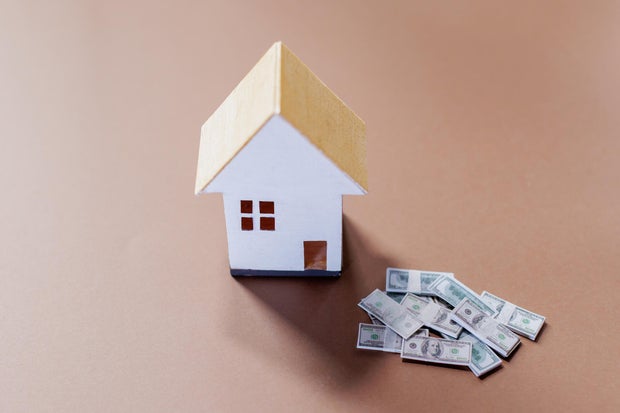 Borrowing home equity to pay off student loans could make sense for some homeowners this fall.
jovo/aerogondo/Getty Images
Borrowing home equity to pay off student loans could make sense for some homeowners this fall.
jovo/aerogondo/Getty Images
Student loan payments plague millions of Americans, and with interest constantly accruing, it can sometimes feel like there's no end in sight. For some consumers, it can even make handling everyday costs and expenses challenging.
If you own a home, though, you might have an option to ease that struggle.
Thanks to rising home prices, homeowners have gained a lot of equity over the past few yeara. And that equity can be borrowed from with products like home equity lines of credit (HELOCs) and home equity loans. You can then use that money toward expenses, medical bills, or, yes, paying off debts like your student loans. In fact, about 40% of home equity borrowers used their loans to consolidate debts last year, according to the Mortgage Bankers Association.
Is it a strategy you should try for your student loans, too, especially in today's economic climate? We asked some experts about this approach — and the risks it could come with.
Start by seeing how much home equity you have to borrow here.
Should you use home equity to pay off your student loans this fall?
Not sure if this is the right approach for your student loan debt now? Here's what experts say to know before proceeding:
There could be some benefits
The big benefit of using home equity to pay off student loans is that it can often simplify your repayment. Instead of making several monthly payments, you would just make one to your home equity lender. This can be easier to track and budget for.
In some cases, using a home equity loan or HELOC to pay off student loans can reduce your interest rate and lower your monthly payment, but that really depends on what type of loan you have and when you took it out.
"Currently, a competitive HELOC rate is near 7% and typically adjustable," says Jason Fannon, a certified financial planner and senior partner at Cornerstone Financial Services. "Federal student loans vary based upon the specific category of loan — undergraduate are at 6.5%, graduate are at 7.5%, and PLUS loans are at 9%, while private loans can have much higher range — as high as 17%, depending on the borrower's credit score."
If you had a private student loan with a double-digit rate, then paying off that balance with a 7 to 9% home equity loan or HELOC would make sense, reducing your rate and payment and freeing up cash flow. But if you had federal loans, which tend to have much lower interest rates, it probably wouldn't be worth it.
"Home equity loans and HELOCs are options for assisting in student loans, but I don't think they are good options as of today," says Eric Elkins, CEO of Double E Financial Solutions. "If you take a snapshot of the student loans taken out over the last 15 years, you will find most of those loans have or had a lower interest rate than leveraging a home equity or HELOC as of today."
Elkins says you may be able to find some HELOCs with promotional interest rates that are worth taking advantage of, but remember: These are usually variable-rate, meaning your rate will likely change over time.
"I'm a fan of consolidating multiple loans into one," Elkins says. "However, if the interest rates on either a home equity loan or HELOC isn't a fair amount less, then I wouldn't focus on consolidation."
See how low your current HELOC and home equity loan rate offers are here.
The risks need to be accounted for
Even if you can secure a much lower HELOC or home equity loan interest rate, it's important to understand the risk these loans pose to your house.
"They're secured by your home, so if you default, the bank will take your home," says Mike Chadwick, owner of Chadwick Financial Advisors and CEO of Fiscal Wisdom Wealth Management. "If you default on a student loan, the only recourse is credit damage. They cannot take your home."
Essentially, this means you need to be sure you'll be able to make your payments. If you can't, your lender can foreclose on the house fairly quickly (usually after three missed payments).
On top of this risk, using equity to pay off student loans can also cause you to lose valuable loan benefits. With federal loans, for instance, you'll lose the ability to apply for Public Service Loan Forgiveness if you enter a public service career. You will also lose forbearance or deferral options (which you can use if you're unable to make payments later on), as well as the government's many flexible loan repayment programs.
"What if we get student loan forgiveness passed?" Elkins asks. "That option would be lost if the balance was moved over to home equity loans."
Finally, there are also fees and closing costs on these home equity products to account for. You can typically expect to pay between 3% and 6% of the total loan amount, so $2,000 to $6,000 for every $100,000.
The bottom line
If you do opt to use home equity to pay off your student loans, do it right. Shop around for your lender and closely compare and analyze all the potential costs.
You should also make sure you're choosing the right product. If you only need a single lump sum and would like fixed monthly payments, a home equity loan is likely your top option. If you think you may need access to more funding over time and can handle potentially fluctuating payments, a HELOC may be the better option.
Aly J. Yale is a contributing writer for the Managing Your Money section for CBSNews.com, covering various personal finance topics, including investing, homebuying, loans and more.


















































